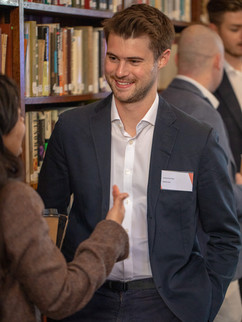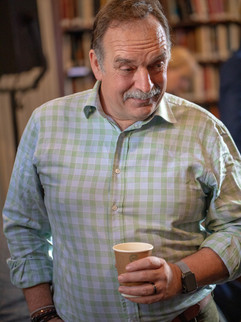Driving quality radiotherapy: Insights from London Global Cancer Week
- Shilo Ramirez
- Nov 25, 2024
- 5 min read
The Global Coalition for Radiotherapy (GCR) co-hosted alongside Radiotherapy UK the session “Spotlight on Radiotherapy: Essential elements for sustainable and quality radiotherapy services” at London Global Cancer Week.
Hosted in the historic Conway Hall, after the World Radiotherapy Awareness Day initiative launch, global experts gathered to present on and discuss implementing productive and quality radiotherapy to all patients.
Learn more about the three key takeaways from this session:
Review the Recording
You can watch a recording of “Spotlight on Radiotherapy: Essential elements for sustainable and quality radiotherapy services” here:
Read below a collection of highlights from each presenter:
Kofi Adesi Kyei, University of Ghana opened the session by highlighting the motivation behind it.
“It is essential for us to strive to deliver safe, quality, and accessible radiotherapy all over the world. With an increasing number of patients with cancer and global economic challenges, it is essential again, we improve productive time to ensure sustainable services, and better outcomes for all our patients.”
Presentation by Speakers
Pat Price, GCR, Radiotherapy UK
“I was thinking here today it's easy to be an advocate for radiotherapy: great technology, fantastic patients, but also what a community. We all talk the same language, it's all geeky stuff, it's multi-disciplinary, industry, clinicians, radiographers, physicists, and then to expand it now globally… It's a privilege to be involved with all you people, so fantastic and great we've got this session today.”
Access, Clinical Service & Patient Flow
Claire Smith, ICON
Workflow Optimization
“I think the key points here are not about saying to our staff, do things faster. It's actually about us leaders, managers, understanding what we're asking them to do, placing them in a position to do it well, [and] taking the pressure from the end of that care flow.”
Laurence Court, MD Anderson
Technology Integration
“AI is here basically, this is something that's going to make massive differences to our workflow- it already is. It’s going to make differences in terms of quality, in terms of consistency, you can imagine…that if I contour something, or if my colleague contour something you're going to get different answers, it's inevitable if you do this stuff manually. AI is really going to change that.”
Vishal Borikar, Varian
Resource Management
“Having training to the right people. Having that overall sustainability. It's not always going to be always possible to have one person sitting next to a clinic or a machine. So having that sustainable strategy in terms of how you're going to handle that challenge of trained resources. I think that is going to make a major difference.”
Solomon Kibudde, Uganda Cancer Inst.
Enhanced Accessibility
“What can be done to improve [Radiotherapy Access]. There are several things which can be done: I think leadership plays a key role, as well as partnerships with people who have done it, and establishing sustainable funding mechanisms to ensure continuity [In order] to overcome these barriers.”
Value-based Funding and Evaluation
Sophie Ward, Amethyst
Seeking collaboration in Public and Private
“We feel that by approaching the communication strategy it provides the patient the tools that they need to perhaps be more in charge of the decision they're making, and I know that seems quite disproportionate, because often they are so overwhelmed and emotional. It’s very challenging. So this idea of empowering the patient through the journey for the decision making in their care plan, is something that is very meaningful.”
Rob Yates, London School of Economics
Funding
“Really be thinking about the political marketing of this. How do you sell this to the key strategic policy makers? So it's all about selling the benefits really. Obviously, the health benefits to the Minister of Health and the population. The economic benefits of all this to the ministers of finance, who control the budgets. But I think the ones we often miss are the sort of societal and political benefits. You know, to really sort of go route one to the politicians who at the end of the day what they want is power to stay in power. And sort of sell this idea to them that if you do right by radiotherapy services, there are votes in this. This will make you popular, and then you get their attention.”
Katie Spencer, RTDS
Data-Driven Decision Making
"Let's not think about just time, from diagnosis to treatment. But if you've just had surgery and you need adjuvant radiotherapy, how quickly are we getting there? Let's integrate our data sets, bring radiotherapy data and surgical data together to start thinking about pathways and not just a diagnosis to a treatment.”
Habib Nehme, Elekta
Service Development, Commissioning and Support
“The digital platform is key as well, because a lot of support of service is remote. We have around like 40% of the cases can be fixed remotely, or in a predictive way. So training either of the personnel, or of the technical engineers are key. Having a local, strong partner as well, who can understand the issues and the particularity of each country is key. So overall, it's not about only selling the equipment, it's about implementing a solution overall that is operational.”
Implementing Quality Radiotherapy
Frederique Moureau, Accuray
Industry Impact on Quality Improvement
“I think we really have got to understand the needs of the country, the healthcare system, and how this can be implemented. With training, as you said, you cannot just get started with hypofractionation without being well educated, educating fully the team. We also have got to work based upon previous experiences. Our experiences in Kenya as well as in Pakistan and in other places, are really eye-opener to us, and we proceed step by step, in learning, in networking, in getting to know much more the country again, the economic status and the needs that there are.”
Lisa Stevens, IAEA
National Cancer Control Plans
“A plan is just a plan, and if you don't implement it, then it's a document that's not going to help the country. But it's bringing together stakeholders from across the cancer care continuum, and that's why I wanted to ensure that we had the whole cancer care continuum. So I know we're focusing today on radiotherapy and the affiliated support. Radiotherapy cannot stand alone, it has to be well integrated into a health system, and that's really what I think the value of national cancer control plans are.”
Nwamaka Lasebikan, AORTIC
Training and Education
“We've talked a lot about technology, and we are looking at how we can use technology to bridge the gap as we try to ramp up training. And there's also a need to look at mentoring programs. There are collaborations, successful collaborations that we have had, that have improved capacity for skills and for research.”
REVIEW THE SLIDE DECKS FROM THE PRESENTATIONS
This slide deck includes presentations from the meeting, and can be downloaded here:
Feedback
GCR would like to extend a special thank you to our speakers, sponsors and participants on this important day.
We have already heard wonderful feedback from our community and great suggestions for future events. Here’s what some have said:
“That was a great experience. Everyone spoke very well. Simple, practical. And it was very interesting to know the real experiences and difficulties for so many countries because of money, culture, etc.”
“More talks on how these amazing Radiotherapy initiatives can be driven to our end-user: the patients in a timely manner.”
“The event was well organized, having panelists and speakers from different RT centers was awesome.”
If you have additional feedback from the event or after reviewing the recording, please share. The feedback from our global community is essential to driving the work forward that we do in the GCR.
Please share your feedback with us on this brief survey:
GCR Radiotherapy Essential Standards
We are excited to launch the process of publishing the GCR Radiotherapy Essential Standards with Global Health Dynamics and are seeking support through engaged authors and sponsors. Contact us to set up a meeting to discuss your involvement.





























































Comentários